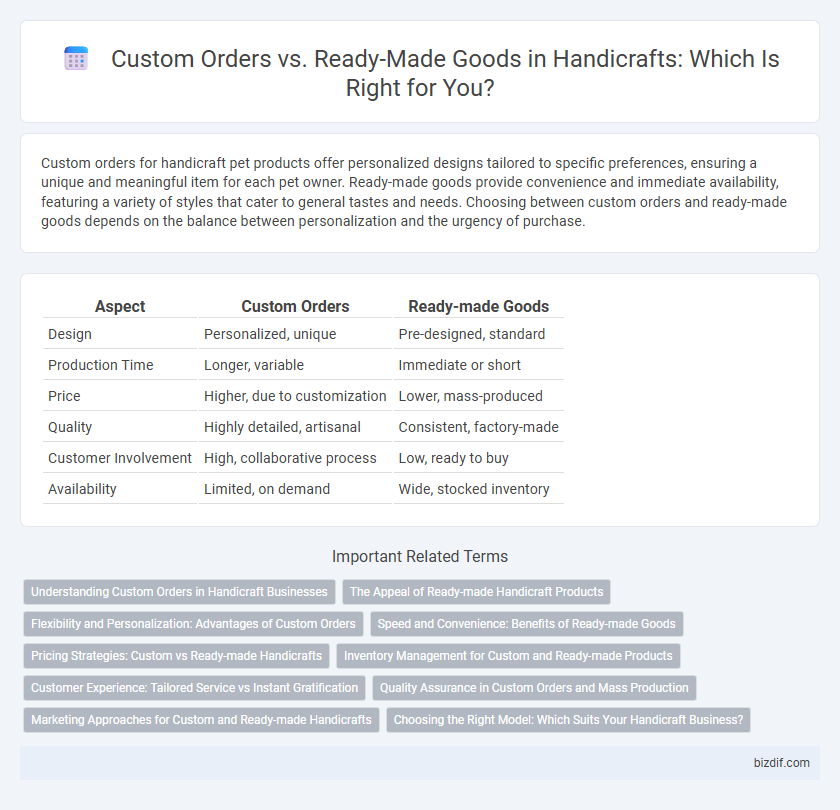Custom orders for handicraft pet products offer personalized designs tailored to specific preferences, ensuring a unique and meaningful item for each pet owner. Ready-made goods provide convenience and immediate availability, featuring a variety of styles that cater to general tastes and needs. Choosing between custom orders and ready-made goods depends on the balance between personalization and the urgency of purchase.
Table of Comparison
| Aspect | Custom Orders | Ready-made Goods |
|---|---|---|
| Design | Personalized, unique | Pre-designed, standard |
| Production Time | Longer, variable | Immediate or short |
| Price | Higher, due to customization | Lower, mass-produced |
| Quality | Highly detailed, artisanal | Consistent, factory-made |
| Customer Involvement | High, collaborative process | Low, ready to buy |
| Availability | Limited, on demand | Wide, stocked inventory |
Understanding Custom Orders in Handicraft Businesses
Custom orders in handicraft businesses demand personalized craftsmanship tailored to specific client preferences, allowing artisans to showcase unique skills and creativity. Unlike ready-made goods, custom orders often involve detailed communication and adjustments, ensuring products meet exact specifications and foster customer satisfaction. This personalized approach can enhance brand loyalty and justify premium pricing due to the exclusivity and bespoke nature of each handcrafted item.
The Appeal of Ready-made Handicraft Products
Ready-made handicraft products offer immediate availability and consistent quality, catering to consumers who value convenience and reliability. These items often showcase standardized designs that appeal to broader markets, making them ideal for gifting or quick decor solutions. Their accessibility allows artisans to reach a wider audience while maintaining efficient production and inventory management.
Flexibility and Personalization: Advantages of Custom Orders
Custom orders in handicrafts offer unparalleled flexibility and personalization, allowing customers to specify materials, colors, and designs tailored to their unique preferences. This customization results in exclusive, one-of-a-kind pieces that reflect individual tastes and occasions. Unlike ready-made goods, custom orders support creative collaboration between artisan and client, enhancing satisfaction and value.
Speed and Convenience: Benefits of Ready-made Goods
Ready-made goods offer unparalleled speed and convenience by eliminating wait times associated with custom orders, allowing immediate purchase and use. These items are readily available in stores or online, ensuring quick access without the need for personalized specifications. Consumers benefit from streamlined shopping experiences and instant gratification, making ready-made goods ideal for time-sensitive needs.
Pricing Strategies: Custom vs Ready-made Handicrafts
Pricing strategies for custom orders in handicrafts often involve higher costs due to personalized designs, material selection, and labor intensity, reflecting the unique value offered to customers. Ready-made goods benefit from economies of scale, allowing artisans to price items more competitively by streamlining production and reducing time per unit. Artisans must balance profitability with market demand by setting premium prices for bespoke creations while offering attractive rates on mass-produced handicrafts to target different customer segments effectively.
Inventory Management for Custom and Ready-made Products
Custom orders require dynamic inventory management focused on raw materials and component availability to accommodate unique specifications and timely production. Ready-made goods benefit from standardized inventory tracking systems that optimize stock levels based on historical sales data and demand forecasting. Efficient segmentation of inventory for custom and ready-made products minimizes stockouts, reduces holding costs, and enhances overall operational efficiency in handicraft businesses.
Customer Experience: Tailored Service vs Instant Gratification
Custom orders in handicrafts offer a tailored service that enhances customer experience by meeting specific preferences and ensuring unique, personalized products. Ready-made goods provide instant gratification through immediate availability, appealing to customers seeking quick purchases without customization. Balancing these options allows artisans to cater to diverse customer needs, combining uniqueness with convenience.
Quality Assurance in Custom Orders and Mass Production
Custom orders in handicraft emphasize meticulous quality assurance through personalized craftsmanship and detailed client specifications, ensuring unique and high-quality products. Ready-made goods produced via mass production often prioritize consistency and volume over individualized attention, which can lead to variations in craftsmanship quality. The bespoke nature of custom orders allows artisans to maintain stringent quality controls that are difficult to achieve in mass-manufactured handicraft items.
Marketing Approaches for Custom and Ready-made Handicrafts
Marketing custom handicrafts requires emphasizing personalization, unique design, and customer collaboration through targeted social media campaigns and interactive content showcasing bespoke creations. Promoting ready-made goods benefits from highlighting variety, immediate availability, and affordability using search engine optimization and online marketplaces to attract impulse buyers. Tailoring messaging to reflect the distinct value propositions of custom orders versus ready-made items enhances consumer engagement and drives sales effectively.
Choosing the Right Model: Which Suits Your Handicraft Business?
Custom orders allow handicraft businesses to offer personalized, unique products that cater directly to client preferences, enhancing customer satisfaction and loyalty. Ready-made goods provide efficient production and quicker sales turnover, ideal for businesses focusing on volume and consistency. Evaluating factors like production capacity, market demand, and pricing strategy helps determine the most suitable model for sustainable growth and profitability in the handicraft industry.
Custom Orders vs Ready-made Goods Infographic

 bizdif.com
bizdif.com